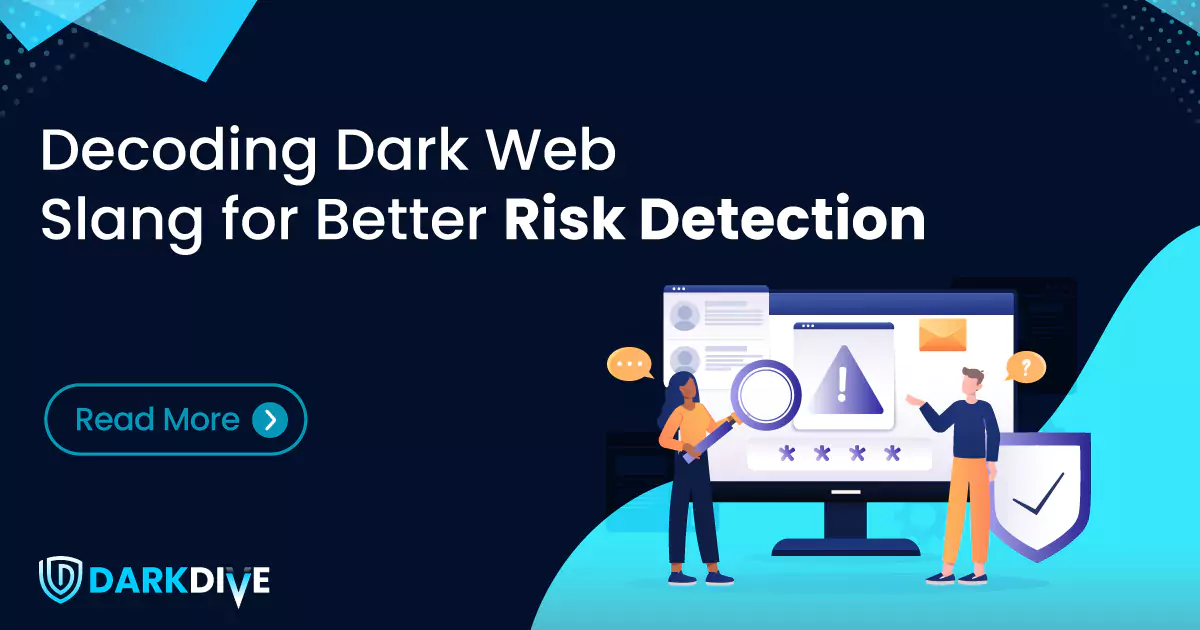
For most teams, monitoring the dark web means scanning for keywords, a company name here, a breached email there. But the dark web doesn’t work like that. It’s not neatly organized or easy to understand. It’s a fast-moving subculture with its own language, slang, and shorthand that evolves weekly.
And if your team doesn’t speak that language, you’re already behind.
Cybercriminals don’t label posts “data breach from Company X.” They speak in coded threads, acronyms, and symbols. A word like “fullz” doesn’t mean anything in a traditional threat feed, but on a dark web forum, it signals a complete identity kit for sale. Miss that, and you might miss the moment your customer data became a product.
This isn’t just linguistic trivia. It’s threat intelligence that matters.
It’s Not Just Jargon—It’s Early Warning
Slang isn’t random. It’s intentional. Threat actors use it to stay under the radar, to talk openly without triggering automated detection systems or attracting law enforcement attention. A casual phrase like “fresh logs” might point to new credentials just harvested from a phishing campaign. “Dox” could indicate that personal employee details are being dumped.
If your monitoring tools don’t catch these terms, or worse, if your analysts don’t understand them, you’re dealing with filtered, delayed, or outright misleading intelligence. And by the time you realize what the post really meant, the damage has already made its way into the attacker’s hands.
What Slang Reveals That Tools Don’t
Here’s what you could be missing if you don’t understand how dark web slang works:
- “Fullz”:
Complete identity kits including name, SSN, address, and financial data - “Logs”:
Credential logs from info-stealer malware, often bundled by company or platform - “Dox”:
Leaked personal info, often used for harassment or extortion - “CVV” or “CC”:
Active credit card dumps, typically sold in bulk - “New drop”:
A recent breach or data set that hasn’t been widely shared yet - “OG”:
Original accounts or handles with high value (e.g., rare usernames or early access privileges)
These phrases don’t just describe data; they reflect intent, timing, and market movement. Most companies only become aware of their discussions when it’s too late to respond.
When You Miss the Meaning, You Miss the Threat
It’s not uncommon for analysts to ignore seemingly irrelevant forum posts, especially if they look like gibberish. But often, that “gibberish” is the clearest signal that your company has been compromised, mentioned, or targeted.
In some cases, a threat actor might use obfuscated references to sell access to your backend tools. In others, a slang-heavy post might detail a phishing template modeled after your customer portal. Without context, those posts are just noise. But with the right understanding, they’re urgent signals.
Slang is the camouflage attackers use. And unless your team knows how to decode it, you’re not just uninformed, you’re at a tactical disadvantage.
How DarkDive Decodes It All
DarkDive doesn’t just collect dark web chatter; it interprets it. Our intelligence engine is continuously trained on underground language shifts, vendor slang, breach codes, and obfuscated references. So when cybercriminals mention your business, even in heavily disguised terms, we catch it.
Instead of flooding you with noise, DarkDive delivers smart, readable alerts that explain what’s being said, where it was found, and why it matters. Whether it’s a thread about “new logs” tied to your platform or a phishing kit mimicking your login page, you’ll see it in time to act.
Because the earlier you understand the threat, the faster you can neutralize it, even when the language is designed to keep you in the dark.
